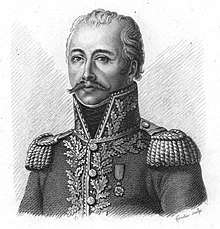Antoine Guillaume Delmas
Antoine Guillaume Maurailhac d'Elmas de La Coste, called Antoine Guillaume Delmas , born June 21, 1768 in Argentat ( Département Corrèze ); † October 30, 1813 (fallen) in the Battle of the Nations near Leipzig was a French Général de division .
Ancien Régime
At the age of 11, Delmas entered the Régiment d'infanterie de Touraine and took part with this in the American War of Independence . The Régiment de Touraine was shipped from the Antilles to the North American continent with the fleet of Admiral de Grasse and was used in the battle of Yorktown in October 1781 . In 1788 he resigned from military service, although his regimental commander, Colonel vicomte de Mirabeau would have liked to keep him.
Revolutionary Wars
In 1791 he was unanimously elected commander of the "1 er bataillon de volontaires de la Corrèze" (1st battalion of Corrèze volunteers). The battalion was assigned to the Armée du Rhin . Here he distinguished himself when he was able to capture a standard from a group of enemy riders and in the process knocked down the two hussars who were defending them. The due announcement was made to the applause of the entire vanguard .
His skill and courage soon earned him the rank of général de brigade and command of the infantry of the advance guard of the army.
Stationed in Landau , Delmas was accused of antirevolutionary activities by the Représentant en mission (the special representative of the Assemblée nationale législative ) and the Jacobins in the city, whereupon he had to flee to the troops near Kaiserslautern . The Jacobin Club in Speyer renewed the allegations from Landau. Although he excelled on the battlefield, he was captured and taken to Paris. However, the military made sure that he was soon released.
Back with the troops, he became a division commander and was responsible for clearing up the fortified area of 's-Hertogenbosch , which was protected from swamps and floods. He carried out a coup d'état at Fort Orthen, where he discovered an open space in the stockade . As he did so, he noticed that the fort's crew was strikingly defensive.
He then said to the officers and eight hussars accompanying him:
“Mes amis, le fort est à nous; qui m'aime me suive
(My friends, the fort belongs to us, whoever loves me follows me.) "
He crossed the ditch with his horse, climbed the parapet, and was the first to enter the fort. The 50 men of the surprised crew were overwhelmed and the very important fort of the defense ring of 's-Hertogenbosch had to surrender.
At the end of 1796, Delmas commanded a division of the Armée du Rhin , which was under the command of Moreau . After a serious wound he returned to France, where after his recovery he took over command of the Armée d'Italie , which he held from February 1 to March 6, 1799. After the fighting in Tyrol, he took over the command of Joubert , who had returned to Paris until he was replaced by Général Schérer .
In the Battle of Magnano he was able to distinguish himself again.
The directorate then offered him command of the 1st division in Paris, which he refused. Instead, he returned to the “Armée du Rhin” to distinguish himself there again. Then back in Italy he was appointed “Lieutenant du général en chef” (1st staff officer).

Consulate and Napoleonic Wars
In 1801 Delmas took command of the troops in Piémont , a kind of banishment that would last for 10 years.
In 1802 he was present at a splendid te deum . When asked for his opinion by the Consul Bonaparte, the Republican replied:
“Belle capucinade! Il n'y a manqué que le million d'hommes qui sont morts pour abolir tout cela.
(Nice mummery. The million men who have fallen to get rid of all of this are still missing here. "
In 1813 he returned to active command and fought with the same courage and bravery that had distinguished him in the past. In the Battle of the Nations near Leipzig he was one of the fallen.
literature
- Alain-Jacques Czouz-Tornare “La Révolution française pour les nuls”
- Charles Mullié, “Biographie des célébrités militaires des armées de terre et de mer de 1789 à 1850”, 1852
Individual evidence
- ^ Bulletin de la Société scientifique, historique et archéologique de la Corrèze, Volumes 90 à 91
| personal data | |
|---|---|
| SURNAME | Delmas, Antoine Guillaume |
| BRIEF DESCRIPTION | French general |
| DATE OF BIRTH | June 21, 1768 |
| PLACE OF BIRTH | Argentat |
| DATE OF DEATH | October 30, 1813 |
| Place of death | Leipzig |
